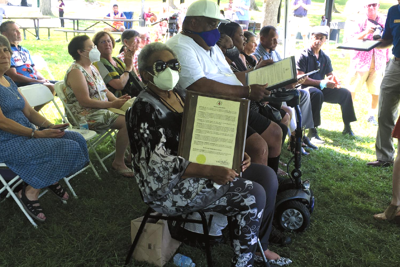In the St. Louis suburb of Creve Coeur, there is a park at the end of a quiet residential lane across from Spoede Elementary School. Its fields, pavilion and playground structures, however, sit on top of a history of racism: it is built on land where pioneering Black opthamologist Howard Phillip Venable and his family were forced out before building their home, though they bought the land and had every right to build the house and the life they’d planned on there.
The Venables fought their case in court against Creve Coeur in the late 1950s and lost to the city’s eminent domain claim. To add insult to injury, the park the city built on the Venables’ former land was named Beirne Park, after Mayor John Beirne, who used all power available to him (and $25,000 of funding raised by those neighbors who did not want the Venables in their neighborhood) to prevent the Venables from moving in.
A group of neighbors learned of the park’s history in 2019, and a movement quickly grew to rename the park in honor of Dr. Venable instead of Beirne. Barry Glantz, Mayor of Creve Coeur at the time, remembered a November 2019 “Coffee with the Mayor” he held to discuss the issue.
“Hundreds of people packed the seats of the auditorium that night,” he said.“Usually when coffee with the mayor had that many people it meant that I’d done something wrong...but that night I think we did something right.”
Even Beirne’s son agreed that the park should no longer carry his father’s name.
Members of the Venable family — now dispersed across the country — got involved in the effort, as did the current government of Creve Coeur, anxious to make some sort of amends for what their predecessors did.
Without much ado, the sign reading “Beirne Park” was replaced with one reading “Venable Memorial Park” two years ago. But the official rededication ceremony of the park didn’t happen until Saturday, having been pushed back several times during the pandemic. Plans to construct a memorial within the park are ongoing, current Mayor Robert Hoffman said.
“This was created by a community, and it takes an entire community to start to correct the mistakes of the past,” said Creve Coeur City Council member Heather Silverman. “People must understand what happened here.”
Six members of the extended Venable family returned to the park Saturday to tell stories of Uncle Howard, a trailblazing Black doctor who worked at the Homer G. Phillips hospital.
As Dr. Rossalind Yvonne Venable Woodhouse, Venable’s niece and eldest living relative, put it, “So many people here are surprised to be here, and I am among that group.”
“Uncle, we are so excited about this occasion. We feel it was overdue, but certainly warranted,” she added, addressing the memory of Dr. Venable directly.
The family continued to tell his stories: how he’d always make his nieces and nephews spell ‘opthamologist’ when they met, how he was a professional jazz trumpet player that performed with Duke Ellington, how he was a tireless advocate for social justice and promoter of equal employment for Black doctors in area hospitals.
The family was then presented with commemorative plaques by members of the Creve Coeur government and the Venable Park Working Group, a multiracial coalition from within the community who have been working on this issue.
Venable brought his family from Detroit to St. Louis in 1943, as the hospital offered internships and residencies for Black doctors that were inaccessible elsewhere. A coalition of former nurses from Homer G., as it is known, came to pay their respects to Dr. Venable, too — days after members of that same coalition spoke out against developer Paul McKee’s recent construction of an urgent care clinic bearing Homer G. Phillips’ name.
Uplifted by his time at Homer G. Phillips, Venable became a world-renowned ophthalmologist, and one of the only Black opthamologists in the nation at the time.
“He had little patience for weak-kneed advocates who keeled over at the first sign of resistance,” remembered Washington University physician and St. Louis Joint Board of Health Chairman Will Ross, who knew Venable for 10 years. “He was a man steeped in social justice.
“He left a legacy worthy of two lifetimes.”











(0) comments
Welcome to the discussion.
Log In
Keep it Clean. Please avoid obscene, vulgar, lewd, racist or sexually-oriented language.
PLEASE TURN OFF YOUR CAPS LOCK.
Don't Threaten. Threats of harming another person will not be tolerated.
Be Truthful. Don't knowingly lie about anyone or anything.
Be Nice. No racism, sexism or any sort of -ism that is degrading to another person.
Be Proactive. Use the 'Report' link on each comment to let us know of abusive posts.
Share with Us. We'd love to hear eyewitness accounts, the history behind an article.